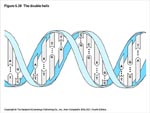

The Nobel
Prizewinner talks about:
The sun, tanning, not being thin and feeling happy.
And then relates all of that to sex. Which in turn relates to evolution.
"Do you think he's lost the plot?" someone asked me just as Professor James Watson finished his talk before an invited audience at University College, London. It was Tuesday June 13th, and we were hot. But then Watson, in his talk entitled 'The Pursuit of Happiness' had certainly suggested that being hot, especially when it's sunny, makes people Happy.
Some people were
Happy when his talk ended, except those who had to wake up. The preliminary
addresses, were rather long. When the grand old man did get to speak to
us, it was with great verve and good humour. And it is some indication
of his light-hearted purpose that when there was a call for questions,
he said about his talk, 'We don't want questions about that, do
we?'
A man in front of me frothed: "He really has lost the plot".
The French woman to my left was delighted. "Ah, great!" she
said. "You have that expression in English, too. 'He's lost the
plug'."
"No. Plot,"
a respected British scientist behind her explained patiently. "That's
what we say. And some people think he has."
"He's just teasing," said the scientist's daughter. (Or wife!
One can never be sure. At any rate, she took the old scientist's arm and
smiled herself sweetly away. She, at least seemed Happy. )
Professor James D. Watson is a Nobel Prizewinner It was he who, with Francis
Crick wrote the famous paper in Nature in April 1953, 'A Structure
for Deoxyribose Nucleic Acid', describing the double helix shape of DNA,
and a number of Life's secrets have been revealed in the wake of that
knowledge.
Controversy has shadowed Watson: It was the first usable X-ray pictures
of DNA taken by Rosalind Franklin (1920-1957) which he used to
determine the double helix shape. Franklin was somehow not included in
the publication that supported the findings which she had made possible
or at least hastened. She died before the Nobel Prize was awarded to Watson
and Crick.(It's always Holmes and Watson. It's always Watson and Crick).
Professor Watson received his medal from University College, London, and
his talk on the Pursuit of Happiness had to do with the importance of
that quest in evolution. Before he began, his own evolution, from brilliant
younger scientist to eminence grise was described. University College,
London, is not free of rhetoric, despite its hip reputation for clear-sightedness,
street-wisdom and sound academic speaking. Watson's younger colleagues
read out such expressions as 'the golden orb of enlightenment', 'health
through knowledge' and 'that we may allow our eyes to see all'.
Seeing
ahead
A more down-to earth colleague, Professor W. Macmurray, told Shebang
that the reason he admired Watson was that 'James can see ahead in ways
that no-one else I have ever known can do. For most of us that would be
enough. For many of us that would be enough. But you look at the effect
of that discovery of the double helix. You look up what he was saying
in the 1970's, for God's sake, about the human genome project, and how
everybody laughed at him, that it would be too costly, would drain resources
and so on. And he foretold all the ethical questions too. I mean he has
been very brash. He has also, unquestionably, been tremendously important.'
Watson is fairly tall for a man of his generation, and speaks with a Chicago
accent in a rather high, hesitant voice. This lends weight to his words,
and assists his comic timing. The problem with the entire talk, though,
was that it did not contain good enough science, and if it was meant to
be funny, it wasn't funny enough.
An obsession
'I have had this idea,' he told us, 'for some considerable time. It is
an idea which has become an obsession. And I just had to tell everyone.
My obsession with this idea has grown over the years.' Pause for effect.
'And there is almost no evidence in its favour.'
'I would like to think,' the Nobel Prizewinner said to us, 'that this will be like the double helix. Because it sounds right.'
Watson admitted that
he was not always especially good at judging the psychology of his audience.
He once had to follow Crick, who had given a marvellous lecture. Watson
took it upon himself to speak about cancer. And he didn't talk very well.
'I was never so depressed,' he said.
His
thesis. Inter-relating factors.
What, then, is Watson's big idea. Well, it all has to do with the sun
and with not being thin and with feeling happy. And all of that
relates to sex.
And thus to evolution.
All of these different aspects of his talk inter-relate. The sun has
a very direct connection with sexuality. The word 'swarthy' conjures up
thoughts of sexuality. And there have been and are many societies in which
women are kept out of the sun, eg. the Victorians or the Elizabethans
who prized 'fairness' for beauty's sake, but also until they are 'ready'
for sexuality. And Watson even speculated if young Muslim are covered
up for this reason.
Watson went on to ask. 'Why do the English go to Spain, to get red?' There has to be a reason, he felt; they don't go so often 'to Skye to climb mountains'. Maybe the sun really does do it. Watson also referred to Latin lovers.
What he had noticed
was that there was some kind of ancestral connection between MSH and MCR
proteins, between the hormone leptin and melanin, and by making such connection,
he had seen that being in the sun, being tanned, made human beings
happy, and also that being in the sun and feeling happy makes them feel
sexy. These connections, so his thesis went, has an effect upon
our evolution, especially when all of those factors in turn were connected
with people feeling a little overweight.



